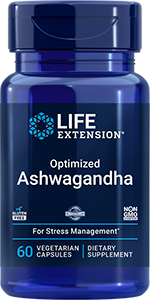
Ashwagandha and L-Theanine: Do They Work Together?
Published: April 2024
Sometimes, it can feel like you've got the weight of the world on your shoulders, and even meditation, exercise and bubble baths aren't enough to fully shake it off. Stress management supplements can play an important role in helping you keep your cool, and two of the most famous options are ashwagandha and L-theanine.
So how do these supplements differ from one another, and which one is best for you—or can you take both of them together?
According to Life Extension's Dr. Crystal M. Gossard, DCN, CNS, LDN, indeed, ashwagandha and L-theanine have a lot of (wonderful) things in common. "They support cognitive function, promote sleep quality, and help in encouraging relaxation," she said. So if they both have these benefits, do you even need to take both? Could doing so be unsafe?
Dr. Gossard's answers may surprise you.
Can you take L-theanine and ashwagandha together?
Let's start at the very beginning: is it even okay to take ashwagandha and L-theanine side by side? It sure is. (Phew!) "It's a good strategy to take them together because their mechanisms of action are complementary," Dr. Gossard said. The two substances play well together, like good friends, even though they play different roles in the body.
Let's start with L-theanine. This calming amino acid found in green tea can help you keep your cool. For example, in a clinical study, L-theanine was shown to promote brain waves associated with a relaxed, but wakeful, state more effectively than placebo. It can work fast, too—within three hours, Dr. Gossard pointed out. L-theanine can help balance out the body's stress response, so it's great for achieving a sense of calm, without making you feel like you need to take a nap.
What about its partner in crime? "On the other hand, ashwagandha works upstream to support healthy stress response and overall well-being by supporting healthy cortisol levels," Dr. Gossard said.
Remember, cortisol is the body's main stress hormone—almost like an innate alarm system. The more you've got, the more wired you're going to feel, almost like your body is telling you, "Alert! Alert! Alert!" even when there's nothing to be worried about. A little bit of stress is normal and even healthy. Too much can be a disaster. So, if you can keep cortisol under control, your overall health will benefit as a result.
So you've got L-theanine slamming the brakes on those overwhelming feelings and ashwagandha keeping your daily cortisol levels on point and helping you sleep at night. The effects of ashwagandha and L-theanine complement each other, supporting mood, attention, stress resilience and relaxation. Feel better, sleep better, perform better.
What's the difference between ashwagandha and L-theanine?
While they work together nicely, in a nutshell, ashwagandha and L-theanine are two different compounds from their own sources that work in special ways. They are both herbal supplements but come from different plants.
Ashwagandha is an evergreen shrub also known as Indian ginseng, winter cherry, and Withania somnifera. Certain parts of the plant (like the ashwagandha root) are used as ingredients in supplements. "Extracts of ashwagandha roots and leaves are commonly used in dietary supplement preparations. The most researched active compounds are withanolide glycosides and oligosaccharides," explained Dr. Gossard.
Then, we have L-theanine, which is a water-soluble amino acid that comes from the leaves that are used to make green tea. (That's why you've maybe read that sipping on green tea is great for calming your mood.) The L-theanine can promote relaxation thanks to its impact on brain waves. That's not all this amino acid can do, though. It can also support a healthy immune response and encourage tissue health.
How does ashwagandha support stress management?
While L-theanine helps you relax when you need to give yourself a time out, ashwagandha helps you keep from getting all worked up in the first place! Indeed, ashwagandha is practically the poster child of adaptogens (substances that help support healthy stress response and cortisol levels).
One way in which ashwagandha can help you tackle stress is by encouraging healthy levels of cortisol. Too much cortisol and your body will feel like it must be on-guard. But when cortisol levels are within a healthy range, you'll feel more comfortable both mentally and physically.
Don't forget, too, that stress is the starting point for many other health challenges. For instance, Dr. Gossard reminds us of some of the downstream effects of long-term stress, such as food cravings and eating behaviors. When you get stress under control, there's an incredible ripple effect, and you can notice the cascade in other areas of your life. Ashwagandha can also support a healthy immune response! The benefits of Withania somnifera are abundant.
Explore Our Best Ashwagandha Supplements
Do ashwagandha and L-theanine make you sleepy?
On their own, neither ashwagandha nor L-theanine actually make you sleepy; just relaxed. But one of the effects of ashwagandha is that it helps with sleep quality—so, it can also be paired with melatonin for well-rounded sleep support. L-theanine, on the other hand, can be useful in helping you settle in for bed, but because it doesn't make you tired, it's also good for helping you be wakeful and aware.
As Dr. Gossard explained, "In humans, L-theanine has been shown to significantly support the alpha brain wave. Alpha brain waves are a measure of relaxation." If you can boost your alpha brain waves, then you can support your mood, and that helps explain the connection between L-theanine and stress.
Note: If you have any concerns about taking these supplements, it's always wise to speak with your healthcare provider first about whether you should move forward and what dosage you should take.
How to Get L-theanine Naturally?
What tweaks can you make to your nutrition to get more L-theanine? A good place to start is with your daily cup of tea. "It's mostly found in the leaves of Camellia sinensis, or green tea," Dr. Gossard said. "L-theanine is a particular taste element of tea with an attractive aroma and a caramel flavor that aids in attenuating the bitterness of caffeine."
However, one cup of green tea contains only about eight to 30 mg of theanine. This means that you'd have to drink a pretty excessive amount of green tea to enjoy the benefits of L-theanine. In fact, it's hard to get enough from any food or beverage. So, if you want to increase the amount of L-theanine you get, it's much more feasible to get what you need via a supplement made with high-quality ingredients.
Ashwagandha and L-theanine: the power couple for less stress
Stress can wreak havoc on you cognitively, physically, and emotionally. Ashwagandha and L-theanine go together like peanut butter and jelly. They're among the best supplements for stress relief and can support various facets of your health. If you need additional help to better your sleep quality, try glycine or melatonin tablets, or speak with your healthcare provider about a more appropriate plan for you.
Want to learn more about which supplements could support a good mood? Take our mood quiz and get personalized recommendations.
References
- Auddy B, et al. "A Standardized Withania Somnifera Extract Significantly Reduces Stress-Related Parameters in Chronically Stressed Humans: A Double-Blind, Randomized, Placebo-Controlled Study." Semantic Scholar. 2008. https://www.semanticscholar.org/paper/A-Standardized-Withania-Somnifera-Extract-Reduces-A-Auddy-Hazra/46bdaebfcf4f00730ad217fd6bb88228964e4c2e
- Boros K, et al. "Theanine and Caffeine Content of Infusion Prepared from Commercial Tea Samples." Pharmacogn Mag. January-March 2016. https://www.ncbi.nlm.nih.gov/pmc/articles/PMC4787341/
- Deshpande A, et al. "A Randomized, Double Blind, Placebo-Controlled Study to Evaluate the Effects of Ashwagandha (Withania Somnifera) Extract on Sleep Quality in Healthy Adults." Sleep Med. August 2020. https://pubmed.ncbi.nlm.nih.gov/32540634/
- Evans M, et al. "A Randomized, Triple-Blind, Placebo-Controlled, Crossover Study to Investigate the Efficacy of a Single Dose of AlphaWave® L-Theanine on Stress in a Healthy Adult Population." Neurol Ther. December 2021. https://pubmed.ncbi.nlm.nih.gov/34562208/
- Li MY, et al. "L-Theanine: A Unique Functional Amino Acid in Tea (Camellia sinensis L.) With Multiple Health Benefits and Food Applications." Front Nutr. April 2022. https://pubmed.ncbi.nlm.nih.gov/35445053/
- Tharakan A, et al. "Immunomodulatory Effect of Withania somnifera (Ashwagandha) Extract—A Randomized, Double-Blind, Placebo Controlled Trial with an Open Label Extension on Healthy Participants." J Clin Med. August 2021. https://www.ncbi.nlm.nih.gov/pmc/articles/PMC8397213/









